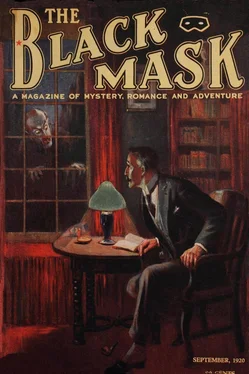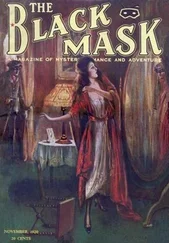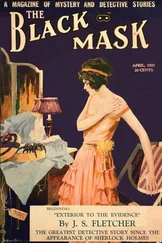J. Kofoed - The Black Mask Magazine (Vol. 1, No. 6 - September 1920)
Здесь есть возможность читать онлайн «J. Kofoed - The Black Mask Magazine (Vol. 1, No. 6 - September 1920)» весь текст электронной книги совершенно бесплатно (целиком полную версию без сокращений). В некоторых случаях можно слушать аудио, скачать через торрент в формате fb2 и присутствует краткое содержание. Город: New York, Год выпуска: 1920, Издательство: Pro-distributors Publishing Company, Жанр: Детектив, на английском языке. Описание произведения, (предисловие) а так же отзывы посетителей доступны на портале библиотеки ЛибКат.
- Название:The Black Mask Magazine (Vol. 1, No. 6 - September 1920)
- Автор:
- Издательство:Pro-distributors Publishing Company
- Жанр:
- Год:1920
- Город:New York
- ISBN:нет данных
- Рейтинг книги:4 / 5. Голосов: 1
-
Избранное:Добавить в избранное
- Отзывы:
-
Ваша оценка:
- 80
- 1
- 2
- 3
- 4
- 5
The Black Mask Magazine (Vol. 1, No. 6 - September 1920): краткое содержание, описание и аннотация
Предлагаем к чтению аннотацию, описание, краткое содержание или предисловие (зависит от того, что написал сам автор книги «The Black Mask Magazine (Vol. 1, No. 6 - September 1920)»). Если вы не нашли необходимую информацию о книге — напишите в комментариях, мы постараемся отыскать её.
The Black Mask Magazine (Vol. 1, No. 6 - September 1920) — читать онлайн бесплатно полную книгу (весь текст) целиком
Ниже представлен текст книги, разбитый по страницам. Система сохранения места последней прочитанной страницы, позволяет с удобством читать онлайн бесплатно книгу «The Black Mask Magazine (Vol. 1, No. 6 - September 1920)», без необходимости каждый раз заново искать на чём Вы остановились. Поставьте закладку, и сможете в любой момент перейти на страницу, на которой закончили чтение.
Интервал:
Закладка:
The theory advanced by the transcendent detectives of fiction — that no human being could enter a room without leaving some clue to his identity — Johnny found to be fallacious. There was not the vestige of a clue in Guerney's study. And why should there be? The murderer had probably slipped into the house — if he was not one of the household — quietly walked upstairs, opened the study door and killed Guerney as the latter sat in his chair. It could only be by the most colossal luck that the killer would drop some identifying bit of personal property, and he had not done so. There had been no rain or snow to make convenient footprints.
Deduction, as practiced by Holmes and Dupin, was all very well, but even those masters had to have some concrete clue from which to argue. There was not a single one for either the Jones or the Gurney murder, yet they were evidently joined by a connecting link. It was inconceivable that it should be otherwise.
The figures of Jones, Bradley and Mildred Guerney filled Suggs' mental vision. His perspective of the case was clogged by their bulk. One of them had very likely committed the crime. Then Jones was killed. Bradley was in prison, and so eliminated from.that angle of the case. But Mildred had been in the house — had been there before Suggs made his unexpected appearance. And she possessed the key to the study door!
Was Mildred Guerney the double murderess?
Every fibre of Johnny Suggs' being revolted at the thought. He thought of her pallid face, clear cut as a cameo, and framed by the crown of soft, fair hair. It was the face of a pure, warm hearted girl — and one utterly incapable of such a crime. It was on her slender shoulders, though, that the black shadow of suspicion lay most heavily.
At dawn Johnny gave up the problem temporarily, washed and shaved, and slipped out of the house without awakening anyone. He took a car downtown, and had breakfast at an all-night restaurant of the lunch-stand variety. It was dim and gray in the city — a gloomy, foreboding morning, with a shroud of fog creeping in from the river.
The reporter lit a cigar, and having nothing particular to do, strolled over to the Star office. The city room was empty save for a sleepy figure curled up in one of the chairs. Suggs' footfalls aroused it.
"H'lo, Johnny," he husked, reaching mechanically for a cigarette. "What 'n the deuce are you doing down here at this time o' night. 'F I was the son of the boss of this paper I wouldn't work at all—" He lapsed back into somnolent desuetude.
"Oh, you wouldn't?" repeated Johnny, with keen sarcasm. "I like Palm Beach and yachts and joy parties as much as you do, but you see me working, don't you? — You'd do it, too, if he was your governor."
"By the way," the other man woke up suddenly. "A note came in for you about eleven o'clock; laying on your desk over there. It's from Bradley, the butler who's been held in this Guerney murder mystery. Friend of yours?"
Suggs picked up the crumpled envelope, with his name scrawled on it.
"Who brought it?"
"A hard looking bird — one of the guards, I guess."
Johnny ripped open the envelope, and read:
Dear Mr. Suggs:
Probably the peculiarity of this will strike you at once. I feel that you are a friend. If you would do me a favor, when you hear of my death — and I feel that the end is not far — will you have my body disposed of as was that of Gustave Edmonson, who wrote "The Psychology of the Working Classes"?
With many thinks for your keenness.
Respectfully yours,
James R. Bradley.The reporter stared at the note.
It might as well have been a jumble of unintelligible gibberish so far as he was concerned.
Then two lines in the letter seemed to spring out in bold faced letters:
"The peculiarity of this will strike you at once" and "Many thanks for your keenness."
The mild eyed old butler was trying to send him a cipher message!
Now, Johnny had gained valuable experience with codes during his service in the Intelligence Section of a famous combat division in France. He had learned to read ciphers of many kinds. So, tired and aching as he was, he sat down at his desk, and tried to unravel this one.
After an hour of concentrated effort, Suggs decided that, if it was a code, it was too cleverly done for him to solve. The letter was so short that it gave him no opportunity. This reference to Gustave Edmonson and his book threw no light on the subject. "The Psychology of the Working Classes" was in the Star's library. Johnny brought it out, read over the contents page and skipped through the volume, but it carried no suggestion to his mind. It was dull and prosy in the extreme and the possibility that it might have any connection with the double murder in the Guerney house seemed rather far fetched.
At eight o'clock he called up Lieutenant Jamieson: "Anything new develop, Loot — in the Guerney case, I mean?"
"New?" howled Jamieson. "Ill say there has. Now, listen, Johnny. I'm giving you this first of all, because you've helped me in the past and, anyway, I want due credit with your dad for giving his paper first crack at it. Soon as I get done talking come down to the Guerney house. I'll be there by the time you arrive."
"All right. Shoot!"
"There's been big doings down there last night. Patrolman Duffy was on special duty in front of the place. He's a good, sober man, and he swore that he wasn't a hundred yards from the house all night. Every hour or two he walked around through the alley and looked things over from the back. He didn't see a light or hear a sound up till three-thirty. At that time Duffy was standing by the Guerney steps, and he heard a shot from inside.
"Well, he rapped for assistance, broke a window and climbed in. He saw a light upstairs and tore up there hell bent for election. The door to the study was open—"
"Open?" interrupted Johnny, "I thought I locked it?"
"What?"
"I said I thought you locked it."
"I did, but open it was, and the furniture was smashed up generally as though there had been a scrap—"
"What?" Suggs was thoroughly surprised now. When he was in the study only a few hours before this occurrence everything had been in apple-pie order. And now—
"I said everything was broken up," the policeman said peevishly. "This damned 'phone's out of order, and you can't hear anything right. Chairs broken up, pictures busted loose from the walls — the room smashed general-ly."
"Come on, get to the finish," urged Suggs. "You're not telling a short story with a carefully arranged climax. I want to get all the dope for the sheet."
Jamieson's hoarse laugh rumbled over the wire. "We found a dead man in the study. You're a clever lad, and quite an amateur detective yourself, but I'll bet you can't guess who it was."
"I've got a ten-spot that says I can," said Johnny, touched in his pride at the policeman's dig at his sleuthing propensities.
"You're on. Who was it?"
Suggs braced himself for the bellow that would come through the receiver.
"J. Sylvester Jones," he said.
"Oh, no," laughed Jamieson. "You thought I was a dummy when I suggested that it might be one of those Dayak fellows who croaked Strickland Guerney. Well, there isn't an acre of green in my eye, son. Patrolman Duffy found one of those Dayaks in Guerney's room, with a bullet hole drilled through his heart!"
Chapter IV
Utterly amazed at this turn of events, Johnny sketched what had been told him to his sleepy compatriot, and that gentleman, galvanized into instant life, began hammering out the story on his typewriter.
"Better let the old man look it over," Suggs suggested. "He's interested in this Guerney affair, and wants to keep his finger on it. Better call him on the 'phone, tell him what's happened and that I've gone up to the house to look things over."
Читать дальшеИнтервал:
Закладка:
Похожие книги на «The Black Mask Magazine (Vol. 1, No. 6 - September 1920)»
Представляем Вашему вниманию похожие книги на «The Black Mask Magazine (Vol. 1, No. 6 - September 1920)» списком для выбора. Мы отобрали схожую по названию и смыслу литературу в надежде предоставить читателям больше вариантов отыскать новые, интересные, ещё непрочитанные произведения.
Обсуждение, отзывы о книге «The Black Mask Magazine (Vol. 1, No. 6 - September 1920)» и просто собственные мнения читателей. Оставьте ваши комментарии, напишите, что Вы думаете о произведении, его смысле или главных героях. Укажите что конкретно понравилось, а что нет, и почему Вы так считаете.












